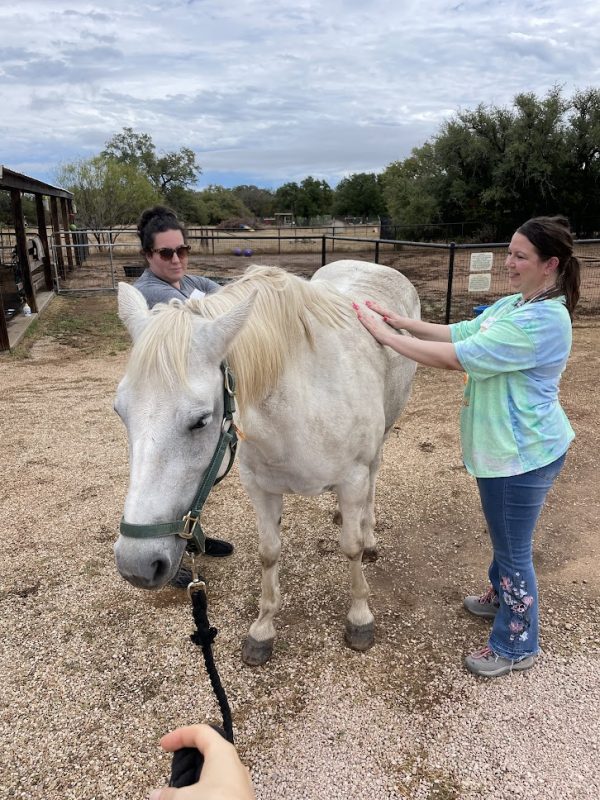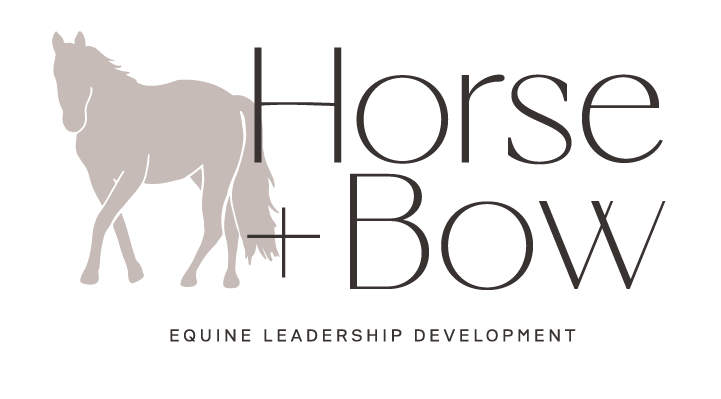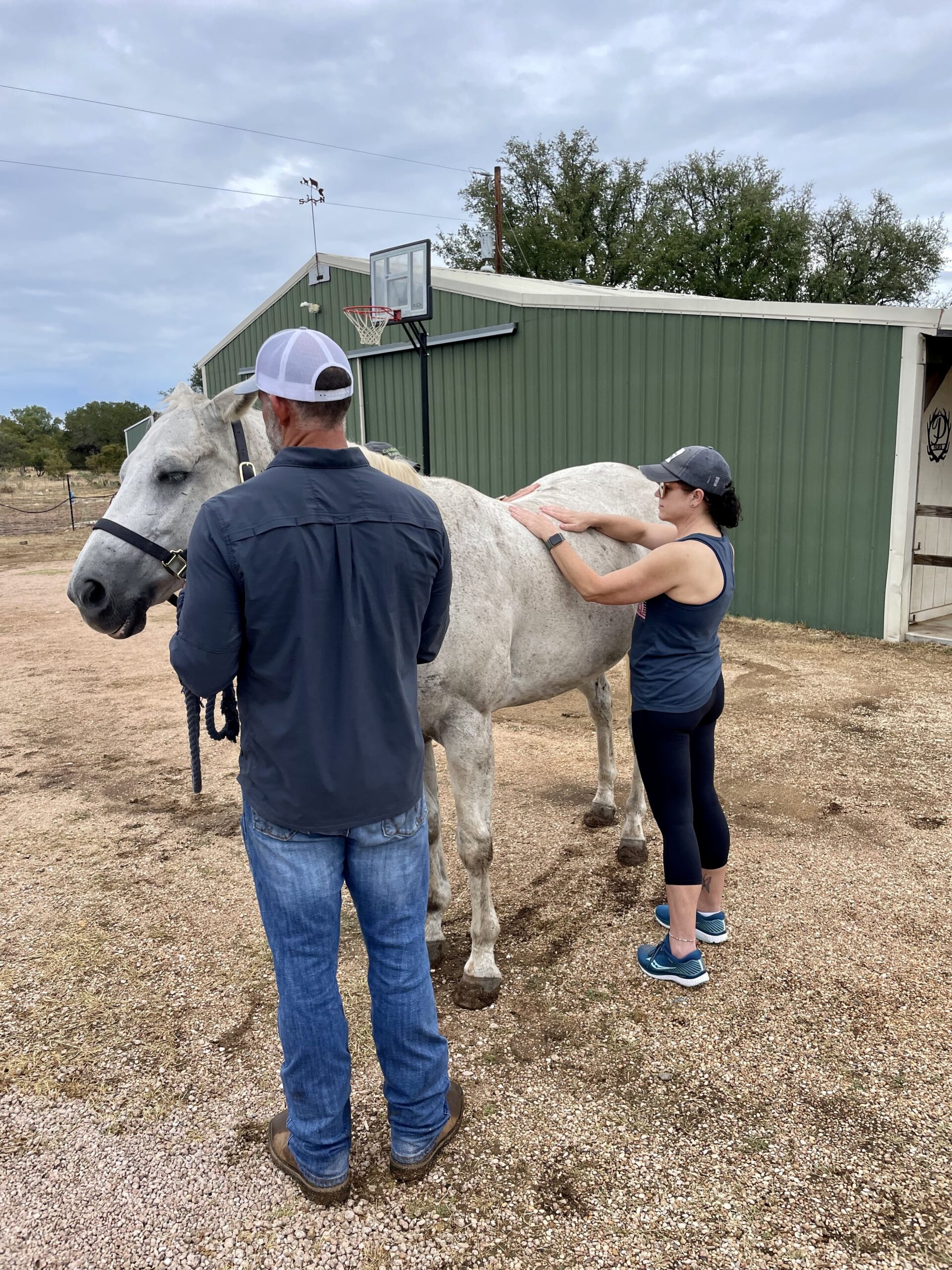
Sensory overload in parents is not something I’ve seen talked about very much. Yet, the modern parent has an overstimulation dilemma. We are bombarded by noise—literal and figurative. From birthday parties at trampoline parks to the constant pings of our phones, overstimulation has become the norm. While we want our children to have fun and stay engaged, these high-intensity environments often leave us frazzled, depleted, and emotionally distant from the very people we’re trying to connect with.
So how do we, as parents, manage sensory overload—and better yet, prevent it?
As a professional coach and equine-assisted learning facilitator, I recently hosted a family whose experience offered a perfect window into what’s possible when we intentionally choose peace over chaos. Even though I’m not a therapist or psychologist, I believe this story offers profound guidance for parents navigating overstimulation in their day to day experience.
A Mom, Two Daughters, and a White Pony
A mother came to our Horse + Bow ranch with her two daughters expecting a fun and casual first riding lesson. What she didn’t expect was a deep, bonding experience centered around emotional regulation, mindfulness, and genuine peace.
We started with introductions—not just of each other, but of the horses. I shared insights about each horse’s background and how they relate to one another as a herd. I emphasized the importance of observing their body language and tuning into the constant, non-verbal dialogue between horses—and between horses and humans.
As they brushed the white pony we’d chosen for the day, the girls and their mom practiced grounding themselves. Calming their bodies. Deep breathing. Slowing down. Even the act of picking up the pony’s hooves required presence and self-awareness.
After riding, we untacked and bathed the pony, then moved on to a special visit with our two miniature donkeys. These skittish animals gave the girls and their mom a powerful lesson in emotional regulation. The donkeys wouldn’t approach until the humans settled their own nervous systems. Only then would the donkeys meet them with curiosity, openness and trust.
It was a simple moment. But it was filled with meaning: when we steady ourselves, we become a safe space for connection.
Overstimulation vs. Connection
After the session, the mom reflected on what made this experience different. She realized most of her shared activities with her daughters involved loud, fast-paced environments—children’s museums, gaming centers, trampoline parks. These places, though designed for fun, left her overstimulated and longing for alone time to recover, rather than feeling closer to her kids.
In contrast, this equine experience brought a sense of peace, connection, and joy. They laughed. They learned. They bonded. She marveled at how something so calm and slow-paced could be so powerful. I was reminded that the environments we choose deeply affect our ability to stay regulated as parents and be fully present with our children.
What Is Sensory Overload? And Why Does It Affect Parents More Than We Realize?
Sensory overload happens when our systems are bombarded by too much information—visually, audibly, and emotionally. This is common not just for children, but for adults navigating the demands of modern parenting. Add to that the constant stream of texts, emails, social media, and news, and it’s no wonder so many parents feel constantly on edge.
I remember hearing something as a child that has stuck with me for decades. A mom asked her husband to turn off the evening news because she didn’t want “that man” (the news anchor) at her dinner table. Today, we let the whole world into our bedrooms, living rooms, and even bathrooms through our phones. The result? Our nervous systems rarely get a break.
Top 4 Ways Parents Can Prevent and Manage Sensory Overload
You don’t have to book a week-long retreat to start reducing sensory overload (although I think getting away and out of your normal routine is a GREAT idea for any parent experiencing sensory overload!). But you do need to make intentional choices every day:
- Choose calming environments – Seek outdoor, nature-based experiences that promote connection and calm, rather than adrenaline and dopamine. Just a 20 minute walk without your phone can make a huge difference. Pro tip: Book a special family equine experience at Horse + Bow!
- Reduce digital intrusion – Silence notifications. Leave your phone in another room. Unsubscribe from all non-essential emails. Grayscale your phone to make addicting apps less attractive. Rearrange your apps to interrupt the pattern of going from texts to emails to Instagram to Facebook which results in endless scrolling.
- Create phone-free zones – Designate times and spaces in your home where no personal devices are allowed. Meal times, bedrooms, or even TV watching time without your phone in hand can reduce our dependence and addiction. Author of the Anxious Generation, Jonathan Haidt, says that watching a full length movie together is actually a good family activity, but endless scrolling of Tiktok or Youtube shorts on an ipad or phone is not!
- Be mindful of your “yes” – You don’t have to attend every birthday party or weekend event. Choose experiences that fill your family up, not drain you. Pro tip: If you feel bad about skipping a friend’s large party, invite them to do something different to celebrate by spending more meaningful, high quality time with just them.
What to Do in the Moment of Overstimulation
When you’re in a situation that’s already overstimulating—like a noisy event or chaotic home moment—here are quick steps to reset:
- Remove unnecessary input – Tuck your phone out of sight. Step outside for a moment if possible.
- Close your eyes and breathe – Focus on your breath and heartbeat for 1–2 minutes. Bonus tip: When you focus on your heart, send a positive emotion to someone in your life. It will not only calm you, but also, will strengthen your connection with that person. Let them know later that you were thinking of them.
- Notice your body – Where is the tension? What might your nervous system be trying to tell you?
- Send calming signals – A few moments of intentional grounding can help reset your nervous system and allow you to re-engage more calmly. Bonus tip: Use the 5, 4, 3, 2, 1 method- name 5 things you see, 4 things you hear, 3 things you feel, 2 things you smell and 1 thing you taste. This gets you present and ready to reintegrate with your environment.
Choosing Presence Over Pressure
Overstimulation doesn’t have to be the norm. By becoming more aware of our own emotional states and making thoughtful choices about the environments we expose ourselves and our children to, we can create more connection and less chaos.
At Horse + Bow, we’ve seen time and again that peace, presence, and bonding happen naturally when families slow down together in nature. Our horses and donkeys are just the facilitators. The real magic happens when humans rediscover their ability to tune in to themselves, each other, and the world around them.
Interested in learning more? Reach out to explore our equine experiences designed for families, teams, and individuals seeking connection, clarity, and calm.
Sensory overload in parents is often caused by environments with excessive noise, visual stimulation, or emotional demand—like loud play areas, crowded events, or constant multitasking. The combination of parenting stress, digital distractions, and overstimulating activities can overwhelm the nervous system.
Common signs include irritability, feeling anxious or frazzled, trouble focusing, physical tension, and the urge to retreat or zone out. Parents often feel overstimulated after outings to places like trampoline parks, gaming centers, or even prolonged screen time at home.
To calm down from sensory overload, step outside or into a quiet space, close your eyes, take 2–3 deep breaths, and focus on your heartbeat. Turning off notifications, removing visual clutter, and engaging in grounding activities like walking barefoot or spending time with animals can quickly regulate the nervous system.
The best activities for overstimulated families are peaceful, slow-paced, and involve nature. Options include equine-assisted learning, hiking, gardening, or visiting quiet outdoor spaces. These activities help reset the nervous system and promote parent-child bonding.
Yes—spending time with horses can significantly reduce parental stress. Horses mirror human energy, encouraging people to slow down, breathe deeply, and become more present. Ground-based activities with horses, like grooming and observing herd dynamics, are proven to promote calm and connection.
Horse + Bow offers quiet, nature-based experiences that prioritize nervous system regulation and connection over stimulation. Unlike indoor play centers, our equine and archery experiences are designed to foster mindfulness, emotional safety, and meaningful family bonding.
Not exactly. Sensory overload is a short-term response to overwhelming stimuli, while burnout is a longer-term state of emotional and physical exhaustion. However, repeated sensory overload can contribute to parental burnout if not addressed.

